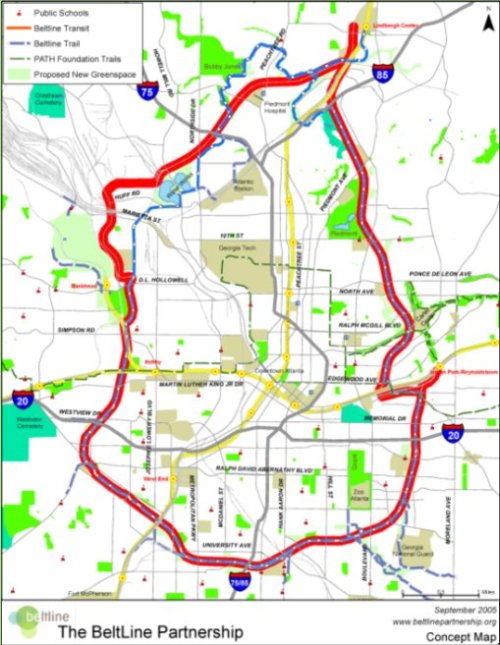Health Impact Assessment of Proposed Atlanta Beltline
Atlanta, Georgia
Source: Pedestrian and Bicycle Information Center (PBIC)
Problem
The proposed Atlanta Beltline is a large-scale transportation and land use development which has the potential to change redevelopment patterns long into the future. The Health Impact Assessment will provide a way to assess the easily overlooked effects and recommend elements to emphasize or change.
Background
The Health Impact Assessment is a tool commonly used in Europe and New Zealand, but is only just beginning to gain ground here in the U.S. The Center for Disease Control is using it to evaluate projects and policies that will impact health but don't have health as a primary focus. The Beltline project grew out of a Georgia Tech student's master thesis and was subsequently picked up by city. The "beltline" is a loop of 22 miles of unused railroad track. The project intends to install a new light rail system along the tracks to connect the downtown neighborhoods and to convert the area surrounding it into a multiuse bicycle and walking trail.

Solution
In 2003, a group called the Healthy Places Research Group was formed to collaboratively explore the built environment and the health of communities. Organizations involved include Emory University's Rollins School of Public Health, Georgia Tech's College of Architecture, the Center for Quality Growth and Regional Development, professionals from the Centers for Disease Control and Prevention (CDC), the pedestrian advocacy group PEDS, neighborhood organization representatives, researchers, and students. Several professionals who had been following the success of health impact assessments abroad came together at these meetings and found the Beltline to be an ideal project to study from this angle.
The Beltline offers the potential not only for an extended system of transit and greenways, but also significant redevelopment in what is now underused industrial area. The Health Impact Assessment will evaluate the expected effects of the project and make recommendations on how best to mitigate the negative impacts and promote the positive ones. Funding was provided through a grant by the Robert Wood Johnson Foundation. Research focused on the impact relating to physical activity, access to parks, transit, healthy foods, safety (including injury and crime), social capital networks, and environmental factors including water resources, brown fields, air quality and noise.
Not only does the Health Impact Analysis aim to identify the risks and benefits associated with the project, but also to involve the community and stakeholders in the process and to communicate these issues to key decision makers. Though funding was not provided for soliciting community input, approximately 1,000 surveys were distributed through neighborhood planning units in addition to being made available online. Researchers aimed to discover what residents felt were important health issues for them, and what their expectations were surrounding the Beltline development project. Despite the fact that funding was lacking to make the surveys truly representative, feedback from residents was able to be used in certain instances to help guide the researchers' inquiries.

A computer simulation of a greenway near transit.
Results
The assessment offered insight into the contributions the Beltline had towards creating a more walkable and healthier Atlanta. The assessment provided information that will allow all health consequences of the Beltline to be included in the policy and design decisions. A final report is available here. The Atlanta Beltline was confirmed for implementation in 2007 and began construction in 2008.
References
Atlanta BeltLine Web site: http://beltline.org/
Contact
Laurie Beck
Centers for Disease Control and Prevention
Atlanta, GA
(770) 488-4327
ldf8@CDC.gov
Michelle Marcus
Georgia Institute of Technology, Center for Quality Growth and Regional Development
(404) 385-5122
Michelle.Marcus@coa.gatech.edu
Image Source
Center for Quality Growth and Regional Development. http://www.cqgrd.gatech.edu/




